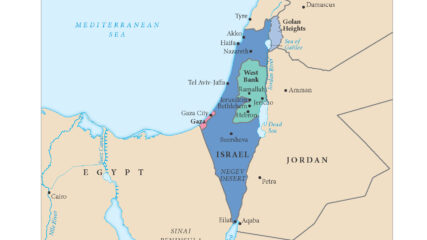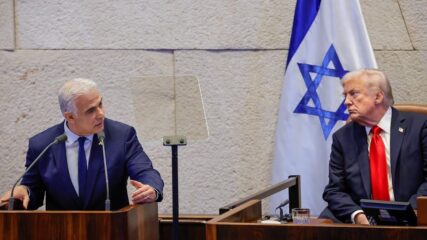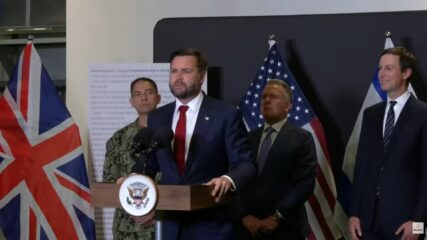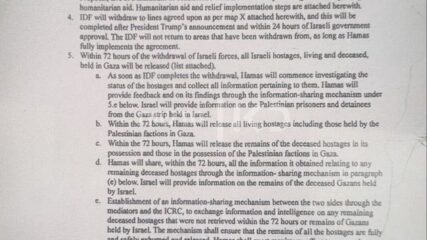July 28, 1988
Source: United States. Daily Report. Near East and South Asia. “London Document.” Washington, D.C.: Foreign Broadcast Information Service, 1988.
When Israel captured the West Bank, portions of Jerusalem, and the Gaza Strip in the June 1967 War, these territories became part of Israel’s future. Previously all of the West Bank and a portion of Jerusalem were governed by Jordan; the Gaza Strip by Egypt. These territories had been part of all of Palestine, administered by the British from 1920-1948. The remainder of the former territories administered by the British became the State of Israel in 1948. As a result of the 1967 War, Israel quadrupled its size with these new lands, but did not choose to annex these lands to Israel nor did it apply sovereignty over them. By controlling these lands, Israel limited the influence that Jordan had developed over the inhabitants in the West Bank and Egypt had over the Gaza Strip. As the new local authority, Palestinians quickly evolved physical animosities against Israel, which in-turn quickened the pace and depth of local Palestinian nationalism. Palestinian national feeling continued to grow as the PLO resorted to violent attacks against Israeli and Jewish institutions in Israel and abroad and locally as Israel built massive numbers of Jewish settlements in the territories. Settlement building also catalyzed Palestinian national feeling. None of the newly Israeli administered lands were affected by any of the Egyptian – Israel agreements that were signed in the 1970s between Israel and Egypt. Treaty.
In the 1980s, tensions between Palestinians and Israelis grew. In November and December 1987, Palestinians took to the streets with civil and violent protests against Israel’s administration and settlement building. Sporadic outbreaks of violence lasted more than three and half years, with some Palestinians expressing deep animosities expressed against the years of Jordanian control over their lives. Less than a year after the violence erupted, King Hussein announced that Jordan would administratively disengage from the West Bank. In his July 1988 speech, Hussein made it clear that Jordan was not withdrawing administrative influence from Jerusalem. Disassociation from the West Bank ensured Jordan’s longevity, as it decided to focus strengthening its geographic national identity exclusively on the East Bank of the Jordan River. In December 1990, Jordan moved to write and promulgate a national charter after its disengagement from the West Bank. Coincidently, Hussein’s disassociation from the West Bank, occurred just three weeks before Hamas, the radical Islamic Palestinian organization issued its Charter emphatically stating that any recognition or negotiation with Israel was prohibited. The PLO found itself negotiating to wrest land from Israel, which required recognition of Israel but also put it in competition with Hamas that refused any political agreements that would accept Israel as a reality. From 1987 to 1993 and beyond, the Palestinian political arena was in an active spin cycle in making choices about its political future.
In this speech, King Hussein articulated the view that “Jordan is Jordan and Palestine is Palestine.” After Jordan’s disengagement, the Palestine Liberation Organization (PLO) opted to engage in diplomacy with the U.S. and afterward secretly with Israel because it had concluded that should Israel leave any of the Palestinian areas, the PLO and not Jordan would gain control. In September 1993, the PLO and Israel signed the Oslo Accords, giving the Palestinians a chance at self-governance over a limited amount of land, but without a Palestinian state promised in the Oslo agreement. Without worrying about the West Bank’s future, Jordan an King Hussein moved forward to sign a peace treaty with Israel in October 1994. That treaty stayed in force for three decades and the Palestinians, for their own internal reasons and Israeli opposition, remain without prospects for evolving into a state structure.
— Ken Stein, January 27, 2023
Jordanian King Hussein on the Hashemite Kingdom’s Separation From West Bank
July 28, 1988
United States. Daily Report. Near East and South Asia. “London Document.” Washington, D.C.: Foreign Broadcast Information Service, 1988.
In the name of God, the merciful, the compassionate, and peace be upon his faithful Arab messenger. Brother citizens: I send you greetings and am pleased to address you in your cities and villages, in your camps and dwellings, in your factories, institutions, offices, and establishments. I would like to address your hearts and minds in all parts of our beloved Jordanian land.
This is all the more important at this juncture, when we have initiated, after seeking God’s help and after thorough and extensive study, a series of measures to enhance Palestinian national orientation and highlight Palestinian identity; our goal is the benefit of the Palestinian cause and the Arab Palestinian people. Our decision, as you know, comes after 38 years of the unity of the two banks and 14 years after the Rabat Summit resolution designating the PLO as the sole legitimate representative of the Palestinian people. It also comes 6 years after the Fez Summit resolution that agreed unanimously on the establishment of an independent Palestinian state in the occupied West Bank and the Gaza Strip as one of the bases and results of the peaceful settlement.
We are certain our decision to initiate these measures does not come as a surprise. Many of you have anticipated it, and some of you have been calling for it for some time. As for its contents, it has been a topic of discussion and consideration for everyone since the Rabat Summit. Nevertheless, some may wonder: Why now? Why today and not after the Rabat or Fez Summits, for instance? To answer this question, we need to recall certain facts that preceded the Rabat resolution. We also need to recall considerations that led to the debate over the slogan-objective which the PLO raised and worked to gain Arab and international support for, namely, the establishment of an independent Palestinian state. This meant, in addition to the PLO’s ambition to embody the Palestinian identity on Palestinian national soil, the separation of the West Bank from the Hashemite Kingdom of Jordan.
I reviewed the facts preceding the Rabat resolution, as you recall, before the Arab leaders in the Algiers Extraordinary Summit last June. It may be important to recall that one of the main points I emphasized was the text of the unity resolution of the two banks of April 1950. This resolution affirms the preservation of all Arab rights in Palestine and the defense of such rights by all legitimate means without prejudicing the final settlement of the just cause of the Palestinian people, within the scope of the people’s aspirations and of Arab cooperation and international justice.
Among these facts there was our 1972 proposal regarding our concept of alternatives, on which the relationship between Jordan on one hand, and the West Bank and Gaza on the other, may be based after their liberation. Among these alternatives was the establishment of a relationship of brotherhood and cooperation between the Hashemite Kingdom of Jordan and the independent Palestinian state in case the Palestinian people opt for that. Simply, this means that we declared our clear-cut position regarding our adherence to the Palestinian people’s right to self-determination on their national soil, including their right to establish their own independent state, more than 2 years before the Rabat Summit resolution. This will be our position until the Palestinian people achieve their complete national goals, God willing.
The relationship of the West Bank with the Hashemite Kingdom of Jordan, in light of the PLO’s call for the establishment of an independent Palestinian state, can be confined to two considerations. First, the principled consideration pertaining to the issue of Arab unity as a pan-Arab aim, to which the hearts of the Arab peoples aspire and which they want to achieve. Second, the political consideration pertaining to the extent of the Palestinian struggle’s gain from the continuation of the legal relationship of the Kingdom’s two banks. Our answer to the question now stems from these two considerations and the background of the clear-cut and firm Jordanian position toward the Palestine question, as we have shown.
Regarding the principled consideration, Arab unity between any two or more countries is an option of any Arab people. This is what we believe. Accordingly, we responded to the wish of the Palestinian people’s representatives for unity with Jordan in 1950. From this premise, we respect the wish of the PLO, the sole and legitimate representative of the Palestinian people, to secede from us as an independent Palestinian state. We say that while we fully understand the situation. Despite this, Jordan will continue to take pride in carrying the message of the Great Arab Revolt, adhering to its principles, believing in the one Arab destiny, and abiding by the joint Arab action.
Regarding the political consideration, since the June 1967 aggression we have believed that our action and efforts should be directed at liberating the land and the sanctities from Israeli occupation. Therefore, we have concentrated all our efforts, over the past 21 years of occupation, on that goal. We did not imagine that maintaining the legal and administrative relationship between the two banks could constitute an obstacle to liberating the occupied Palestinian land. Hence, in the past and before we took measures, we did not find anything requiring such measures, especially since our support for the Palestinian people’s right to self-determination was clear.
Of late, it has become clear that there is a general Palestinian and Arab orientation which believes in the need to highlight the Palestinian identity in full, in all efforts and activities that are related to the Palestine question and its developments. It has also become obvious that there is a general conviction that maintaining the legal and administrative relationship with the West Bank, and the consequent special Jordanian treatment of the brother Palestinians living under occupation through Jordanian institutions in the occupied territories, goes against this orientation. It would be an obstacle to the Palestinian struggle which seeks to win international support for the Palestine question, considering that it is a just national issue of a people struggling against foreign occupation.
In view of this orientation, which was bound to stem from a purely Palestinian desire and an unflinching Arab determination to support the Palestine question, we have a duty to favorably respond to its requirements. First and last, we are part of our nation and we are eager to support its causes, foremost among which is the Palestine question. Since there is unanimous conviction that the struggle for liberating the occupied Palestinian territory can be bolstered by disengaging the legal and administrative relationship between the two banks, then we must perform our duty and do what is required of us.
As we favorably responded to the appeals made to us by Arab leaders at the Rabat Summit of 1974 which asked us to continue to deal with the occupied West Bank through Jordanian institutions to support the steadfastness of brethren there, we today, favorably respond to the desire of the PLO, the sole legitimate representative of the Palestinian people, and also to the Arab orientation regarding consecrating the purely Palestinian identity in all of its elements in terms of form and content. We beseech God to make this step of ours a qualitative addition to the growing struggle being waged by the Palestinian people for the sake of attaining liberation and independence.
Brother citizens, these are the reasons, the considerations, and the convictions that prompted us to respond favorably to the PLO’s desire and to the general Arab orientation which is in harmony with this desire, as we cannot continue to maintain this undecided situation which serves neither Jordan nor the Palestine question. We had to go out of the tunnel of fears and doubts to the atmosphere of tranquility and clarity, where mutual confidence flourishes and blossoms into understanding, cooperation, and affection in favor of the Palestine question and also in favor of Arab unity, which will remain a cherished objective sought and demanded by all Arab peoples.
However, it should be clear that our measures regarding the West Bank are connected only with the Palestinian territory and its people, and not the Jordanian citizens of Palestinian origin in the Hashemite Kingdom of Jordan. All of them have citizenship rights and commitments just like any other citizen, regardless of his origin.
They are an integral part of the Jordanian state to which they belong, on whose soil they live, and in whose life and various activities they participate. Jordan is not Palestine and the independent Palestinian state will be established on the occupied Palestinian territory after its liberation, God willing. On this territory, the Palestinian identity will be embodied and the Palestinian struggle will blossom as confirmed by the blessed uprising of the Palestinian people under occupation.
If national unity in any country is dear and precious, it is for us in Jordan more than that. It is the basis of our stability and the cause of our development and prosperity as well as the foundation of our national security and the source of our faith in the future. It is also a living embodiment of the principles of the Great Arab Revolt which we inherited and whose banner we are proudly carrying. It is also a living example of constructive plurality and a sound nucleus for any formula of a more comprehensive Arab unity. Based on this, safeguarding national unity is a sacred matter that will not be compromised. Any attempt to tamper with it under any slogan will only help the enemy carry out its expansionist policy at the expense of Palestine and Jordan alike. Consequently, true nationalism and genuine pan-Arabism lie in bolstering and strengthening national unity. Moreover, the responsibility to safeguard it falls on every one of you. There should be no room among us for a slanderer or a traitor. With God’s help, we shall always be one cohesive family whose members are joined by bonds of brotherhood, affection, awareness, and the common national and pan-Arab objectives.
Perhaps the most important thing to remember as we stress the need to preserve national unity is that the stable, productive communities are those in which order and discipline prevail. Discipline is the solid fabric that binds all people in a solid, harmonious structure that blocks all avenues before the enemies and opens the horizons of hope for the coming generations.
The constructive plurality which Jordan has been practicing since its establishment and through which it is witnessing progress and prosperity in all aspects of life, does not only increase our belief in the sacredness of national unity, but also in the importance of Jordan’s pan-Arab role by presenting itself as a living example of the merger of various Arab groups on its soil within the framework of a good citizenship and one Jordanian people. This example, which we are experiencing on our soil, is the one which gives us confidence in the inevitability of attaining Arab unity, God willing.
If we closely examine the spirit of the age, we will see that self-assertion does not conflict with the achievement of institutional unity formulas that include all Arabs. There are living and existing examples in foreign countries. Perhaps the clearest example is the EC, which now seeks to achieve political European unity after it has succeeded in achieving economic integration among its members. As it known, the ties, relations, and basic elements that connect the Arabs are much greater than those connecting the European peoples.
O citizens, brother Palestinians in the occupied Palestinian territory, in order to eliminate any doubts that would be cast on our measures, we would like to stress to you that these measures do not mean the relinquishment of our pan-Arab duty toward the Arab-Israeli conflict or the Palestine question. These measures also do not mean a relinquishment of our belief in Arab unity. We have basically taken these measures, as I said, in response to the wish of the PLO, the sole and legitimate representative of the Palestinian people, and in response to the prevailing Arab conviction that such measures would contribute to supporting the Palestinian people’s struggle and their blessed uprising.
Jordan will continue to support the Palestinian people’s steadfastness and their valiant uprising in the occupied Palestinian territory within the limits of its capabilities. I will not forget to say that when we decided to cancel the Jordanian development plan in the occupied territories, at the same time we managed to contact the various friendly governments and the international institutions that expressed their desire to contribute to the plan. We urged them to continue to finance development projects in the occupied Palestinian territory through the concerned Palestinian circles.
Brothers, Jordan has not relinquished and will not relinquish its support for the Palestinian people until they achieve their national objectives, God willing. No one outside Palestine has ever had or will ever have connection with Palestine or with its cause that is stronger than the connection of Jordan or my family with it. This is on the one hand. On the other hand, Jordan is a confrontation state, and its border with Israel is longer than that of any other Arab state.
In fact, Jordan’s border with Israel is longer than the borders of the West Bank and the Gaza Strip together with it. Jordan also will not relinquish its commitment to participation in the peace process. We contributed to the efforts to achieve an international unanimity on holding an international conference for peace in the Middle East to reach a just and comprehensive peaceful settlement to the Arab-Israeli conflict, and to reach a settlement of all aspects of the Palestine question. We have defined our stands in this regard, as everyone knows, through the six principles that we previously announced to the public. Jordan, brethren, is a basic party to the Arab-Israeli conflict and the peace process. It shoulders its national and pan-Arab responsibilities accordingly.
I thank you and I repeat my heartfelt wishes to you, beseeching Almighty God to help us, guide us, make us please Him, and to grant our Palestinian brothers victory and success. He is the best of helpers.
May God’s peace and blessings be upon you.









